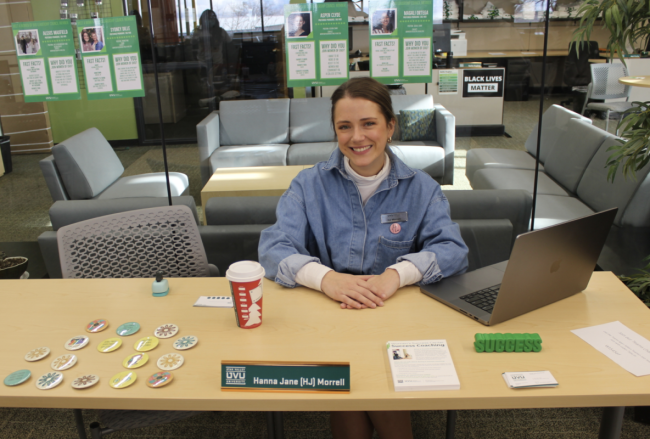You have /5 articles left.
Sign up for a free account or log in.

Hanna Jane Morrell is a women’s success coach coordinator at Utah Valley University’s Women’s Success Center.
Utah Valley University
Fifty percent of Utah Valley University students identify as female, but this wasn’t always the case: historically—and in ways that defied national trends about women’s college achievement—women enrolled and graduated from the university at significantly lower rates than men. As recently as 2011, for instance, 43 percent of UVU students were women, and the university noticed particularly high rates of women dropping out after their sophomore years.
Seeking to address these disparities, UVU in 2011 created a Women’s Success Center.
Success Coaching, Services and Scholarships
Part women’s center, part student success center, the Women’s Success Center at UVU served approximately 900 students of all genders last fall, through a combination of services and offerings:
- Success coaching, which connects students with existing resources and support.
- A women’s leadership academy, which helps students find or be mentors as they build leadership skills for college and beyond.
- A student-led group called Women of UVU, which offers a community of support.
- Access to an accredited childcare facility, the Wee Care Center (which operates on a semester-to-semester basis for registration but will soon launch drop-in care as well).
- A scholarship program designed to address the No. 1 issue noncontinuing students report in campus exit surveys: financial concerns. Scholarships, most of which are privately funded and awarded based on need, generally last one year and average half of tuition. Recipients—who number 149 this year—are required to meet several times with a success coach.
Students in the center’s Scholarship Success Coaching persist at rates 17 percent higher than their matched peers, according to data from the center.
“We knew that awarding money alone was not enough to really move the needle on student success—what we needed to do was pair it with tying the student to the resources they would need throughout their experience,” says Tara Ivie, associate vice president for inclusive excellence at UVU and former center director. “So we fundraise money, bring that in, and we pair it with success coaching. We’ve got a highly skilled staff who triage the academic, personal and basic needs that students have and then either provide the support they need or referrals to the best resources to help that student better navigate their landscape.”
Every year, Ivie says, “we bring in an entirely new cohort of scholarship recipients, so that ripple effect really moves throughout the campus, because we’re a large school. We’ve got 43,000 students, and we’ve got to make sure that our impact is scalable.”
Getting Students ‘In the Door’
Center staff members also reach out to high schoolers and high school counselors in the local area to promote the value of a college degree for women—and those around them.
“Increasing our community’s understanding of the value of the college degree was a really important step forward,” Ivie says. “Not just talking about how a degree can get you a better job—which, obviously, there’s ample research to show that you’re going to have better employment and higher incomes, more stability, more flexibility. But we also needed to talk about all of the positive impacts on health and relationships and marriages, how it builds stronger communities.”
A Holistic Approach to Model
Ivie reiterates that the Women’s Success Center serves students of all genders. And while the center initially was established to boost women’s enrollment, she says, it works because it takes a holistic approach to student success.
“That focus on seeing a student as a whole person is really why we’ve been successful, because if we were to only focus on academics, we would have missed the entire function,” Ivie says, adding that women’s abilities or grade point averages were never the issues. “It was helping them navigate their whole life that’s really led to our success.”
In this sense, she says, the model is exportable, even where gendered enrollment patterns differ from UVU’s.
“The model that we’re leveraging is that combination of IQ and EQ,” or emotional quotient, Ivie says. “It’s the intentional blending of data-informed and person-centered. You can put any label on that, as long as it’s getting those students you’re trying to serve in the door.”
Campus leaders, faculty members and staff are invited to contribute their best ideas and practices for possible use in our new Student Success news hub. Share here.





